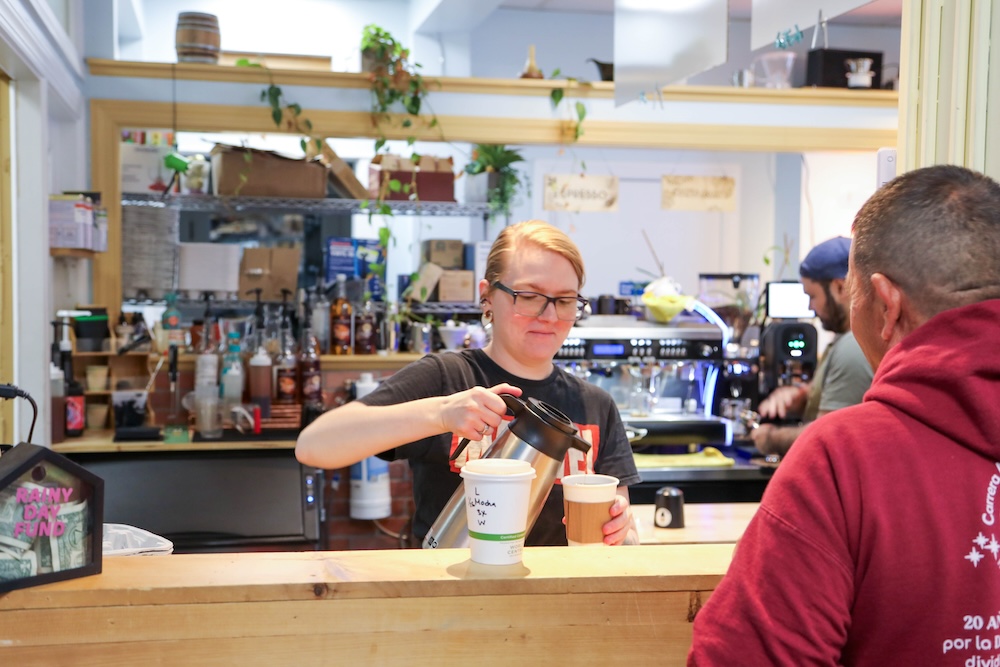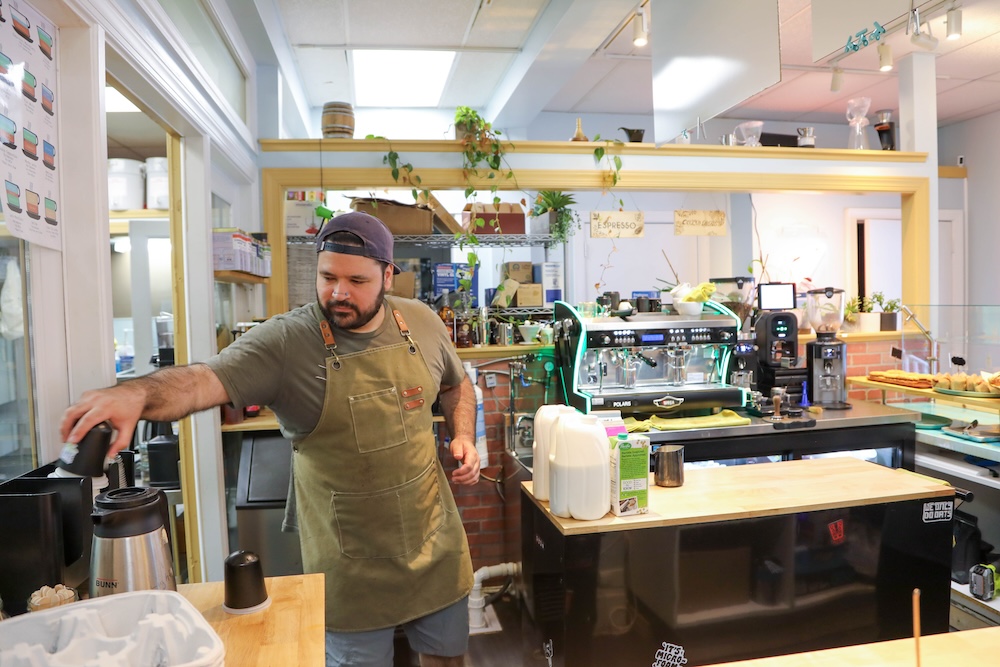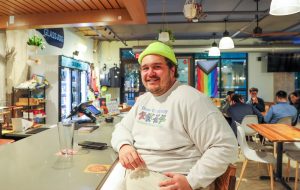A giant mason jar is nestled on the teal countertop of Whisk & Rye Bakehouse + Coffee. It’s stuffed full of dollar bills, left by customers wooed by the shop’s collection of pastries, selection of beverages, or the friendliness of its employees — but curiously, there are hardly any coins.
“When we run out of pennies, it normally aligns with presidential elections,” joked Andy Olivares, one of the co-owners. “People will be more frugal.”
Co-owners Olivares and Shelby Smith say sales dipped around the November election and didn’t bounce back until early February. Now, thanks to President Trump’s ever-changing tariff policy, they are once again preparing for economic shocks.
“We’re terrified of tariffs,” Smith said.

President Trump’s “Liberation Day” tariffs caused Whisk & Rye’s main coffee supplier to briefly raise coffee prices between 10 and 40%, depending upon the country of origin. President Trump has now reversed his “retaliatory tariffs” for most countries, but Olivares said coffee prices haven’t fallen yet. The administration’s unpredictable trade policy is adding uncertainty to the already volatile coffee market, making it difficult to pinpoint what exactly is causing fluctuations, he said.
Whisk & Rye isn’t raising its prices yet, but its owners are nervous.
“Our ideology is to keep coffee affordable,” Olivares said. “We’re going to be looking at regions and costs seriously. Paying $4 or $5 a pound is still manageable, but $9 or $10? You’re looking at luxury coffee.”
Chicano Roasters — the coffee brand Olivares and Smith have started — relies on imported beans from Mexico, Colombia, and Brazil. Even before the Trump administration’s latest round of tariffs, prices had already gone up 20 to 50 cents per pound in anticipation of the expected changes. A 44-pound bag of Mexican coffee beans has increased by $74 since November 2024, to $292 per bag.
While the pair are still considering launching Chicano Roasters as a wholesale business, they’re likely going to delay expansion due to rising prices and economic uncertainty.
***
Whisk & Rye began as a pop-up bakery in 2018, with Smith running the one-woman show. It filled a niche in the market: at the time, hardly any other local bakeries offered vegan croissants. As demand grew, Smith transitioned to the wholesale market, selling her goods to established coffee shops. Then in 2020, Whisk & Rye became a mobile bakehouse, operating out of an outdoor trailer that could take advantage of the pandemic’s social distancing regulations.
By October of 2021, Smith and Olivares had grown tired of using a communal commercial kitchen. So, Whisk & Rye invested in its current storefront on University Drive.
The shop has a loose, casual atmosphere. Its small interior is a mix of wood and plaster, with abstract paintings, neon lights, and coffee puns strewn across the walls. Potted plants line the bar and there’s even a tree placed in between the tables. In addition to its countertop of baked goods, there’s also a wall lined with merchandise like Whisk & Rye t-shirts and beaded bracelets for purchase.
On the weekends, the store teems with families. While parents talk shop with each other or the employees, kids stand on their tippy toes to peer at the latest round of sweet (and savory) treats.
The rotating menu spotlights Smith’s original recipes. Each day, Smith posts the new offerings on the business’ Instagram feed. Some menu items correspond with seasons or holidays, while others are pragmatic choices based on what produce is most affordable. Recently, blueberries and strawberries have been unusually inexpensive so Smith has experimented with those ingredients.
Olivares has also incorporated his Mexican heritage into some Whisk & Rye creations. His personal favorite are the orejitas, thinly rolled puff pastries. Both Smith and Olivares are from Florida, and Smith sometimes makes cubano croissants a nod to the Cuban sandwiches they both grew up eating.
Both transplants, they have worked hard to build relationships with community members. They offer leftover pastries to the barbershop next door and talk about tax bills, growing kids, and bad weather with regulars. When customers mention they haven’t seen a favorite menu item in a few months, Smith will often bring it back for a week or two.
“When we began here, with working and being in school, we didn’t really have much time to make friends,” Smith said. “Now, we get to talk to people every day.”
In a literal sense, Whisk and Rye is a mom and pop shop. Olivares and Smith are partners in both life and work, each easily dedicating more than 80 hours a week to their business. Wednesday through Sunday, they arrive at 6 a.m. and don’t leave the store until 5 p.m. Just two employees help them staff the cash register or prepare beverages each day. Even on Tuesdays, when the store is closed, both come in to get ready for the week ahead.
The shop has no investors, and Olivares and Smith try not to take out large loans. The pair also recently started Chicano Roasters; rather than buy from middlemen, they now roast their own coffee, cutting its cost from $65 to $30 a bag.
Because of the small size of the business, Whisk & Rye has little margin for error.
For instance, Olivares and Smith delayed replacing the shop’s floorboards so it could best be timed with taxes.
“The extra money that we put away for savings, I need to spend it before the end of the year. Otherwise, it gets taken away in taxes.” Smith said. “Sometimes we don’t hit it right, and we lose all that money.”
Though they’re keeping a close watch on the administration’s shifting trade policies, Olivares and Smith are committed to Whisk & Rye. The co-owners say that Durhamites also are incredibly supportive of small businesses over franchises.
“It sounds cheesy and all, but we do this because it’s something we really want to do,” Olivares said. “It’s cool to be integrated into local people’s lives. It feels good to know people enjoy what we’re making.”
Above: Andy Olivares, co-owner of Whisk & Rye, is nervously watching federal policies as he makes plans for the coffee shop. Photo by Abigail Bromberger — The 9th Street Journal
Katelyn Cai





